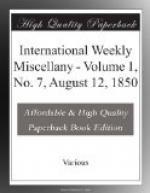When he ceased to be a minister of the crown, that general movement throughout Europe which succeeded the deposition of the elder branch of the Bourbons rendered parliamentary reform as unavoidable as two years previously Catholic emancipation had been. He opposed this change, no doubt with increased knowledge and matured talents, but with impaired influence and few parliamentary followers. The history of the reform debates will show that Sir Robert Peel made many admirable speeches, which served to raise his reputation, but never for a moment turned the tide of fortune against his adversaries, and in the first session of the first reformed parliament he found himself at the head of a party that in numbers little exceeded one hundred. As soon as it was practicable he rallied his broken forces; either he or some of his political friends gave them the name of “Conservatives,” and it required but a short interval of reflection and observation to prove to his sagacious intellect that the period of reaction was at hand. Every engine of party organization was put into vigorous activity, and before the summer of 1834 reached its close he was at the head of a compact, powerful, and well-disciplined opposition. Such a high impression of their vigor and efficiency had King William IV received, that when, in November, Lord Althorp became a peer, and the whigs therefore lost their leader to the House of Commons, his Majesty sent in Italy to summon Sir Robert Peel to his councils, with a view to the immediate formation of a conservative ministry. He accepted this responsibility, though he thought the King had mistaken the condition of the country and the chances of success which had awaited his political friends. A new House of Commons was instantly called, and for nearly three months Sir Robert Peel maintained a struggle against the most formidable opposition that for nearly a century any minister had been called to encounter. At no time did his




